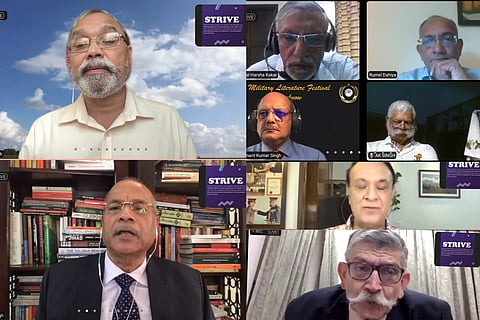11th Military Literature Festival Discusses “Buoyant Sino-Pak Collusivity: Impact on India”
Lucknow, October 25 (TNA) Military Literature Festival, Lucknow in collaboration with 'STRIVE' a Lucknow based National and Defence Security Studies Centre organised a webinar on a highly sensitive and contemporary issue the “Buoyant Sino - Pak Collusivity : Impact on India” on Sunday.
The event was also broadcasted live on You Tube. Brigadier Rumel Dahiya (Retd), Dr Vikram Singh, former DGP UP and Maj Gen Harsha Kakkar spoke on various facets of the rapidly changing geo-political environment between the three nuclear neighbours in the region. The programme was anchored by Lt. Gen. Dushyant Singh (Retd).
This collusion by the two neighbours has been working to our detriment for almost seven decades. Brigadier Dahiya highlighted the various concerns likely to be faced by India following the Sino - Pak collusivity. Amongst other things he highlighted that China was supporting Pakistan to balance India, manage its internal security situation in Xinjiang, providing China an opening to the Islamic world especially Turkey and access to the Arabian Sea to overcome the Malacca Dilemma.
Dr. Vikram Singh highlighted the potentially explosive internal security situation arising due to the China - Pak Collusivity especially along the Indo-Nepal border, cyber threats targeting India’s infrastructure and power projects and likelihood of Pakistani ISI sponsored elements infiltrating the air traffic control system thus causing air crashes and air traffic chaos.
He suggested taking a re-look at our internal security laws and make them more robust to deal with the new age threats such as cyber threats, information war and law fare. He emphasized that we need to be alert and proactive to face the emerging threats and ensure an effective intelligence setup. Maj Gen Harsha Kakkar laid out the options that India has to deal with threats emanating from Pakistan in collaboration with China.
In particular he highlighted the new found ability of Pakistan to shift its terror bases and networks into Afghanistan to shift the blame of indulging in terrorism to Afghanistan. He highlighted the conventional and unconventional threat to India. Audience also participated actively and in particular Maj Gen BK Sharma, Director of United Services Institution, New Delhi highlighted the new emerging areas in which collusive threat is likely to pose serious security challenges.
These include the Siliguri Corridor, consequences of China-Bhutan border agreement, Depsang Bulge, placement of Pakistan military officers in Western Theatre Command of China etc. Summing up the deliberations Lt Gen Dushyant Singh highlighted the need to map the emerging areas of collusivity between China and Pakistan and its manifestation against India so that the threats are managed not only proactively but the fight taken to the adversary in which we need to develop the wherewithals to undertake multi - domain warfare in a the grey zone. Maj Gen Chaturvedi thanked Team Military Literature Festival and Team Strive for this collaboration to address security concern of high importance .
Upcoming session of the Military Festival on October 30-31 will talks on ' Climate of Conquest' – a book by Dr Pratyay Nath on warfare of the Mughal Armies, cartographic history of Lucknow Cantt
by Sonal Mithal and veterans from the Forces who have done exceedingly well after retirement -based on book – 'Success From Being Mad ' by Col Rakesh Sidhu.

